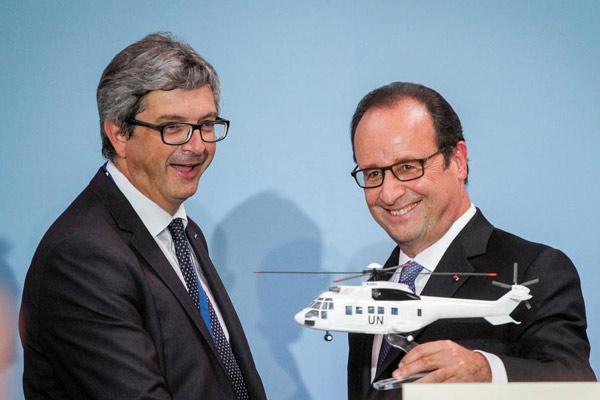France angry with Poland after it scraps Airbus deal
Updated: 2016-10-09 08:52
(Agencies)
|
|||||||||
 |
|
Christian Cornille, Executive Vice President Industry at AIRBUS Helicopters (L) and French President Francois Hollande share a laugh while looking at a model helicopter in Ghimbav, Romania, September 13, 2016. [Photo/Agencies] |
PARIS - France reacted angrily on Friday after Poland scrapped a multi-billion dollar helicopter deal with Airbus, saying it would review defence cooperation with its NATO ally and cancelling a presidential visit to Warsaw.
Poland had agreed to buy 50 Airbus utility helicopters in April 2015 for 13.5 billion zlotys ($3.5 billion) as part of efforts to modernize its military.
Its previous, centrist government, which was beaten by the Law and Justice (PiS) party in elections last October, had agreed the provisional deal. But on Oct 4 the new administration said it was scrapping the contract altogether.
Members of the new eurosceptic government have said they would rather see the deal awarded to a company that could build the helicopters locally.
"The Franco-Polish bilateral relationship will undeniably be extremely affected by this decision," a French source close to the matter said.
"The contract's cancellation will force us to review all the defence cooperation that we have with Poland and see what can be maintained and sadly what can't in the current context."
Without indicating which investments, the source added that the French government, which holds roughly 11 percent in Airbus, would advise the firm to review its strategy in the country, including investments that had already been made.
A source in the French presidency said earlier that President Francois Hollande had decided to cancel a visit to Warsaw next week for intergovernmental consultations, in protest.
Polish Foreign Minister Witold Waszczykowski attempted to play down the spat, emphasizing that Poland had offered "important concessions" in the failed commercial negotiations.
Today's Top News
Joint missile defense drill set for 2017
Snowden appeals extradition lawsuit
Samsung may permanently halt Galaxy Note 7 sales
Turkey, Russia sign deal on natural gas project
Trump goes on offensive, but Clinton more eloquent
China, Portugal pledge to upgrade cooperation
France angry with Poland after it scraps Airbus deal
Pound plunges 6% in Asian trade on Brexit fear
Hot Topics
Lunar probe , China growth forecasts, Emission rules get tougher, China seen through 'colored lens', International board,
Editor's Picks

|

|

|

|

|

|







